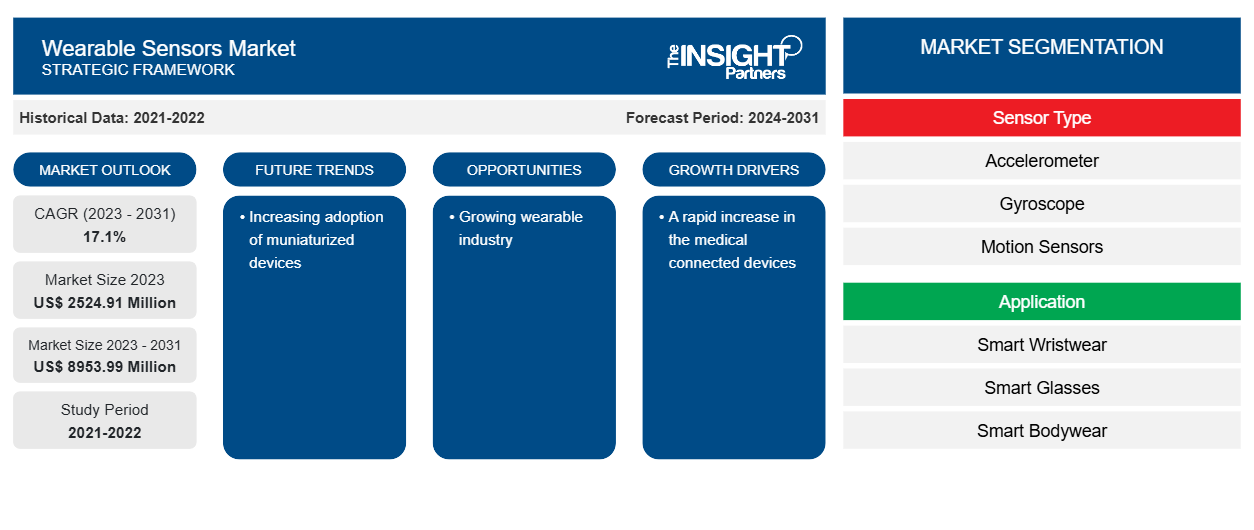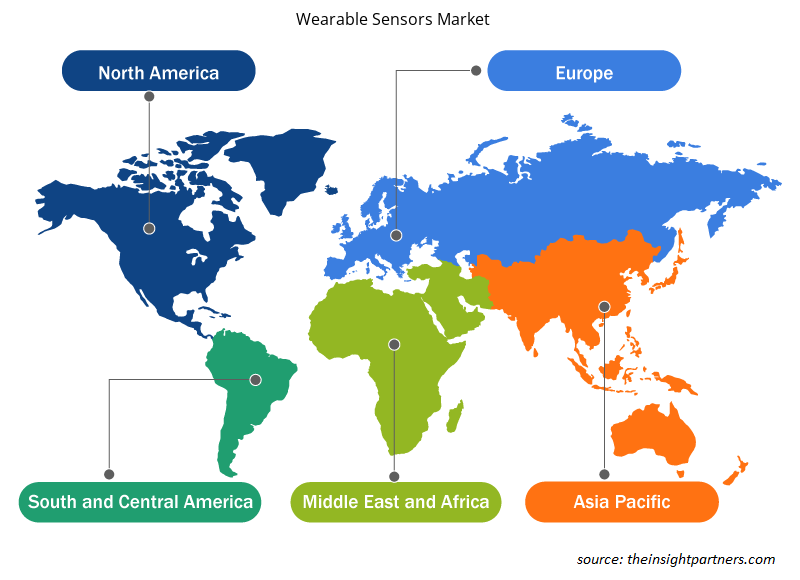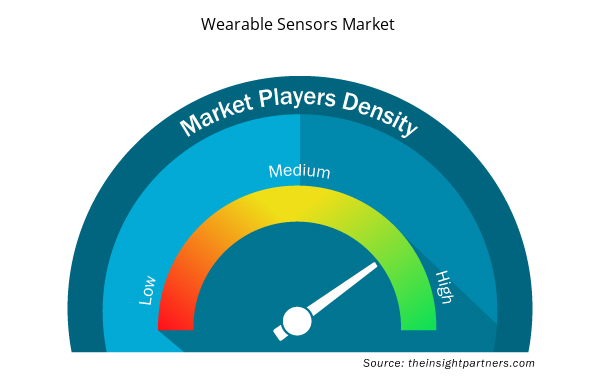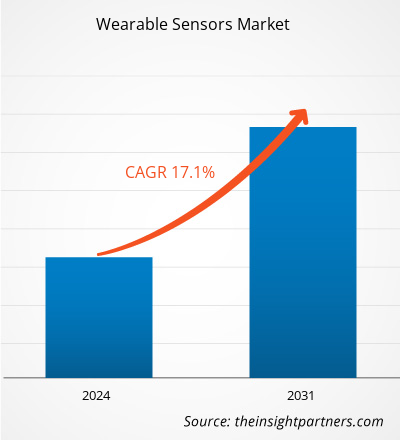The wearable sensors market size is projected to reach US$ 8953.99 million by 2031 from US$ 2524.91 million in 2023. The market is expected to register a CAGR of 17.1% during 2023–2031. Increasing adoption of miniaturized devices is likely to remain a key trend in the market.
Wearable Sensors Market Analysis
A rapid surge in the use of connected devices and smartphones and the growing need for low-power, lighter, smaller sensors with developed performance are the factors establishing the trend of miniaturization. Advancements in micro-fabrication and nanotechnology technologies have been boosting the progress of the miniaturization process, thereby anchoring the emergence of smart fabrics and making smart sensors cost-effective. Future, Abbott Laboratories demonstrated the Libre 3 System, a glucose monitoring system, in January 2022. Thus, the increasing demand for wearable devices drives the global wearable sensors market.
Wearable Sensors Market Overview
Wearable sensors are sensors that are directly attached to human skin or clothes for gathering biological signals with the purpose of personal healthcare. Flexible thin films of MNPs are deposited on the appropriate substrates for temperature and pressure control as the health signals. With the introduction of the Internet of Things (IoT) technology, all sorts of things are being connected to the Internet. As part of this trend, progress is being made in the creation of mechanisms for collecting data from wearable devices and using artificial intelligence (AI) to analyze this data. Wearable devices such as eyewear, wristwatches, and wristbands are already available. Nevertheless, recent developments include items that can be worn every day, such as shirts, and highly sensitive, multifunctional, and lightweight flexible devices made using thin films and elastomers.
Customize This Report To Suit Your Requirement
You will get customization on any report - free of charge - including parts of this report, or country-level analysis, Excel Data pack, as well as avail great offers and discounts for start-ups & universities
Wearable Sensors Market: Strategic Insights

- Get Top Key Market Trends of this report.This FREE sample will include data analysis, ranging from market trends to estimates and forecasts.
Customize This Report To Suit Your Requirement
You will get customization on any report - free of charge - including parts of this report, or country-level analysis, Excel Data pack, as well as avail great offers and discounts for start-ups & universities
Wearable Sensors Market: Strategic Insights

- Get Top Key Market Trends of this report.This FREE sample will include data analysis, ranging from market trends to estimates and forecasts.
Wearable Sensors Market Drivers and Opportunities
A rapid increase in the medical connected devices
Digital healthcare is an expansive concept that includes concepts that are connected between healthcare and technology. Connected medical devices are a major factor when a patient is to be monitored remotely. These devices are truly transforming the healthcare industry by seamlessly connecting patients and healthcare providers with medical information. For a decade or so, technological advancement has witnessed the beginning of digital healthcare devices that enable patients and providers to reduce the communication gap. Smartphone apps such as connected BP monitor oxygen levels, keep track and generate significant data. Most of the connected devices are equipped with varying capabilities, such as real-time monitoring and high-resolution imaging. This contributes to improving the health of the patient. With digital health technology, patients can receive care from any area of the world. Wearable sensors are widely used in such devices, boosting the market growth of wearable sensors.
Growing wearable industry
Smart mobile devices and the Internet of Things (IoT) have enhanced the development of wearables since they provide many benefits to users and create new opportunities in the market. From consumer wearables that support a healthier lifestyle to medical wearables that help control a patient’s vital signs, sensing components help bring these wearable technologies to life, offering users productivity, a sense of safety, and health incentives. As the wearable industry continues to grow, the need for more compact, accurate, and reliable sensing technologies becomes necessary for proper long-term functionality in wearables.
Wearable Sensors Market Report Segmentation Analysis
Key segments that contributed to the derivation of the wearable sensors market analysis are sensor type, application, and vertical.
- Based on the sensor type, the wearable sensors market is divided into accelerometers, gyroscopes, motion sensors, image sensors, pressure & force sensors, touch sensors, position sensors, and others. The customized segment held a larger market share in 2023.
- By application, the market is segmented into smart wristwear, smart glasses, smart bodywear, smart footwear, and others.
- By vertical, the market is segmented into consumer electronics, healthcare, and industrial & enterprise.
Wearable Sensors Market Share Analysis by Geography
The geographic scope of the wearable sensors market report is mainly divided into five regions: North America, Asia Pacific, Europe, Middle East & Africa, and South & Central America.
North America dominates the wearable sensors market. According to the GSM Association, it was projected that the smartphone penetration rate in North America was around 81% in 2021. The association also stated that ~329 million people have subscribed to mobile services. Mobile continues to add to the economy, with and technologies mobile services generating 4.2% of GDP in 2021, in North America. This high penetration rate can be ascribed to various factors, including widespread internet access, advanced telecommunications infrastructure, and a high standard of living. Thus, demand for wearable sensors is increasing in the region.
Wearable Sensors Market Regional Insights
The regional trends and factors influencing the Wearable Sensors Market throughout the forecast period have been thoroughly explained by the analysts at Insight Partners. This section also discusses Wearable Sensors Market segments and geography across North America, Europe, Asia Pacific, Middle East and Africa, and South and Central America.

- Get the Regional Specific Data for Wearable Sensors Market
Wearable Sensors Market Report Scope
| Report Attribute | Details |
|---|---|
| Market size in 2023 | US$ 2524.91 Million |
| Market Size by 2031 | US$ 8953.99 Million |
| Global CAGR (2023 - 2031) | 17.1% |
| Historical Data | 2021-2022 |
| Forecast period | 2024-2031 |
| Segments Covered |
By Sensor Type
|
| Regions and Countries Covered | North America
|
| Market leaders and key company profiles |
Wearable Sensors Market Players Density: Understanding Its Impact on Business Dynamics
The Wearable Sensors Market market is growing rapidly, driven by increasing end-user demand due to factors such as evolving consumer preferences, technological advancements, and greater awareness of the product's benefits. As demand rises, businesses are expanding their offerings, innovating to meet consumer needs, and capitalizing on emerging trends, which further fuels market growth.
Market players density refers to the distribution of firms or companies operating within a particular market or industry. It indicates how many competitors (market players) are present in a given market space relative to its size or total market value.
Major Companies operating in the Wearable Sensors Market are:
- Texas Instruments Incorporated
- NXP Semiconductors
- Analog Devices Inc
- STMicroelectronics
- Infineon Technologies AG
- Sensirion AG
Disclaimer: The companies listed above are not ranked in any particular order.

- Get the Wearable Sensors Market top key players overview
Wearable Sensors Market News and Recent Developments
The wearable sensors market is evaluated by gathering qualitative and quantitative data post primary and secondary research, which includes important corporate publications, association data, and databases. A few of the developments in the wearable sensors market are listed below:
- Signify announced installing LED lighting in the recently inaugurated Ahmed Hamdy 2 Tunnel. Signify uses the latest lighting systems that match international specifications to enable remote control of lighting while delivering up to 70% energy savings. (Source: Signify, Press Release, October 2021)
- Tungsram Group signed an agreement in December to install the lighting of “Túnel de Tresponts” in Spain. The project marks the 6th tunnel lighting deal that the Budapest-based company has been awarded in Spain in 2020, a considerable achievement in light of the economic difficulties caused by the coronavirus pandemic. (Source: Tungsram Group, Press Release, September 2022)
Wearable Sensors Market Report Coverage and Deliverables
The “Wearable Sensors Market Size and Forecast (2021–2031)” report provides a detailed analysis of the market covering below areas:
- Wearable sensors market size and forecast at global, regional, and country levels for all the key market segments covered under the scope
- Wearable sensors market trends as well as market dynamics such as drivers, restraints, and key opportunities
- Detailed PEST/Porter’s Five Forces and SWOT analysis
- wearable sensors market analysis covering key market trends, global and regional framework, major players, regulations, and recent market developments
- Industry landscape and competition analysis covering market concentration, heat map analysis, prominent players, and recent developments for the wearable sensors market
- Detailed company profiles
- Historical Analysis (2 Years), Base Year, Forecast (7 Years) with CAGR
- PEST and SWOT Analysis
- Market Size Value / Volume - Global, Regional, Country
- Industry and Competitive Landscape
- Excel Dataset



Report Coverage
Revenue forecast, Company Analysis, Industry landscape, Growth factors, and Trends

Segment Covered
Sensor Type, Application, and Vertical

Regional Scope
North America, Europe, Asia Pacific, Middle East & Africa, South & Central America

Country Scope
Argentina, Brazil, Canada, China, France, Germany, India, Italy, Japan, Mexico, Russian Federation, South Korea, United Arab Emirates, United Kingdom, United States
Frequently Asked Questions
North America dominates the wearable sensors market.
A rapid increase in the medical connected devices and the growing wearable industry are the major factors that propel the global wearable sensors market.
The increasing adoption of miniaturized devices is anticipated to play a significant role in the global wearable sensors market in the coming years.
The key players holding majority shares in the global wearable sensors market are Texas Instruments Incorporated, NXP Semiconductors, Analog Devices, Inc, STMicroelectronics, Infineon Technologies AG, Sensirion AG, Robert Bosch GmbH, Panasonic Corporation, TE Connectivity Corporation, and TDK Corporation.
The global wearable sensors market is expected to reach US$ 8953.99 million by 2031.
The expected CAGR of the global wearable sensors market is 17.1%.

 Get Free Sample For
Get Free Sample For